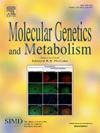Parental psychosocial outcomes after a positive newborn screen for a lysosomal storage disorder
IF 3.5
2区 生物学
Q2 ENDOCRINOLOGY & METABOLISM
引用次数: 0
Abstract
Purpose
This study explores the psychosocial impact of a positive newborn screen (NBS) result for four lysosomal storage disorders (LSDs) (Fabry disease, Krabbe disease, Mucopolysaccharidosis Type I, Pompe disease) across confirmatory results.
Methods
Parents whose child who had a positive NBS for one of the included LSDs were recruited for a retrospective cohort (n = 80) or prospective, longitudinal cohorts (n = 50). Surveys assessed uncertainty, anxiety, intrusive or avoidant thoughts, and perceived vulnerability of their child's health. In-depth interviews explored the NBS experience and psychosocial response.
Results
Participants experienced uncertainty and anxiety during confirmatory testing that improved as parents received more information. Retrospective cohort surveys showed ongoing levels of anxiety and perceived vulnerability in parents of children with carrier or pseudodeficiency results closer to those with true positive or inconclusive results than to false positives of undetermined cause. Interviews indicated some parents across cohorts and confirmatory results held uncertainty about their child's health, frequent thoughts about NBS, and vulnerable views of their child.
Conclusion
This mixed-methods study provides evidence that NBS for LSDs may be associated with extended psychosocial impacts for some families, even if their child does not have an LSD. Lower false positive rates and additional counseling may limit the burden.
新生儿溶酶体贮积症筛查阳性后的父母心理社会结局
目的:本研究探讨四种溶酶体贮积症(Fabry病、Krabbe病、I型粘多糖病、Pompe病)新生儿筛查(NBS)阳性结果的社会心理影响。方法采用回顾性队列(n = 80)或前瞻性纵向队列(n = 50)招募NBS阳性儿童的父母。调查评估了不确定性、焦虑、侵入性或回避性想法,以及对孩子健康的感知脆弱性。深入访谈探讨了国家统计局的经验和社会心理反应。结果在确认性测试中,参与者经历了不确定性和焦虑,随着父母获得更多信息而改善。回顾性队列调查显示,携带者或假缺陷儿童的父母的持续焦虑水平和感知脆弱性更接近于真阳性或不确定结果,而不是原因不明的假阳性。访谈表明,在队列和确认性结果中,一些家长对孩子的健康状况不确定,经常想到NBS,对孩子的看法很脆弱。结论:这项混合方法的研究提供了证据,表明对LSD的NBS可能与一些家庭的广泛社会心理影响有关,即使他们的孩子没有LSD。较低的假阳性率和额外的咨询可能会减轻负担。
本文章由计算机程序翻译,如有差异,请以英文原文为准。
求助全文
约1分钟内获得全文
求助全文
来源期刊

Molecular genetics and metabolism
生物-生化与分子生物学
CiteScore
5.90
自引率
7.90%
发文量
621
审稿时长
34 days
期刊介绍:
Molecular Genetics and Metabolism contributes to the understanding of the metabolic and molecular basis of disease. This peer reviewed journal publishes articles describing investigations that use the tools of biochemical genetics and molecular genetics for studies of normal and disease states in humans and animal models.
 求助内容:
求助内容: 应助结果提醒方式:
应助结果提醒方式:


